20 Benefits Of Potato Juice For Your Skin And Health
Not just for chips and fries, they also make a mean juice bursting with nutrients.
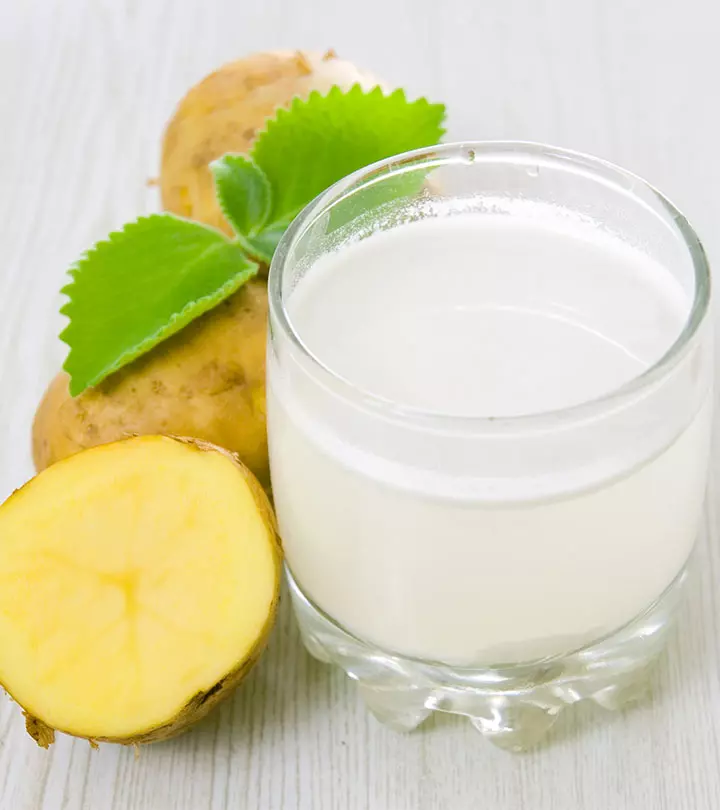
Image: iStock
Potato juice benefits will persuade you to add this nutrient-dense drink to your diet. Juicing potatoes is a healthy way to consume potato nutrients like potassium, calcium, iron, phosphorus, and copper are some of the nutrients found in this beverage. This juice boosts immunity, relieves arthritis, and cleanses the liver. Additionally, it may provide relief from constipation and ulcers.
This article discusses the benefits of potato juice and its side effects. Read on.
 Know Your Ingredient: Potato Juice
Know Your Ingredient: Potato JuiceWhat Is It?
A yellow or white, thin liquid extracted from raw potatoes.
What Are Its Benefits?
It lowers cholesterol levels, relieves gout, hydrates your skin, and promotes weight loss.
Who Can Use It?
Anybody can consume this juice except people with diabetes and on blood thinning medications.
How Often?
You can drink 1 to 2 glasses of potato juice daily.
Caution
Consult your doctor if you are pregnant or breastfeeding. Excess consumption may cause bloating, diarrhea, and increased blood sugar.
In This Article
What Is Potato Juice?
Simply put, it is the juice that comes from raw potatoes. Potato juice contains a host of nutrients, including vitamins B and C, potassium, calcium, iron, phosphorus, and copper.
Since potato juice is a nutrient-rich beverage, it offers a wide range of benefits for the body. Let’s take a look at some of them.
Key Takeaways
- Potato juice contains niacin that may promote blood flow and boost normal body function.
- Essential nutrients like fiber and vitamins in potatoes may help in cholesterol management in the body.
- Mixing potato juice with curd and applying it on the face may reduce and delay the onset of wrinkles.
- A hair pack made of potato juice, honey, and egg yolk may improve scalp conditions like dandruff and itching.
What Are Its Health Benefits?
Potato juice offers many benefits for our overall health. Some of these are backed by research, and some of them have been followed blindly since decades. Read on to know more.
1. Boosts The Immune System
Potatoes contain a significant amount of vitamin C – the nutrient that fights cold and infection and helps to strengthen the immune system.
Drinking a glass of potato juice regularly wards off diseases and improves your immunity.
2. Relieves Arthritis

Potato juice has wonderful anti-inflammatory effects that help to relieve most kinds of pain associated with swelling, inflammation, or redness.
Drinking potato juice was believed to cure arthritis and other joint and back pains associated with arthritis (1). Traditional remedies also included applying compressed potatoes to the joints directly or taping a sliced potato to the joint to eliminate the soreness and pain. Overall, it enhances joint health.
3. Heals Ulcers
Potato juice was found to have gastrointestinal protective effects. It may also help treat ulcers (2).
Drinking a glass of potato juice daily works as a preventive measure to stop the development of stomach ulcers. It also works as an antibacterial probiotic drink.
4. Detoxifies The Liver And Gallbladder
Potato juice is one of the most inexpensive ways to cleanse the liver and gallbladder. The Japanese use this juice to treat hepatitisi Inflammation of tissues of the liver caused by damage from a viral infection or heavy use of alcohol, or certain medicines. .
You can test its detoxifying effects by drinking a glass of potato juice every day as soon as you wake up or 30 minutes before breakfast. It is one of the best natural detox drinks which you can have without any hassle in the comfort of your house.
5. Lowers Cholesterol
Potatoes contain essential nutrients like fiber and vitamins A, B-complex, and C
. These nutrients help lower the cholesterol levels in the body. Drinking a glass of potato juice without straining out its pulp can be highly beneficial for your overall health and cholesterol levels.
6. Treatment For Migraines

It is said that raw potatoes and their juice have been used in European traditional medicine for centuries. You can rub a slice of potato or potato juice on the forehead and temples to relieve pain, stress, and even migraines. There is no scientific research done yet to back up this claim, but positive results have been recorded from people all over the world.
7. Cures Constipation
Potatoes contain a significant amount of fiber, a non-nutrient that is extremely useful for treating constipation and cleansing our digestive system (3). Having a glass of potato juice with the pulp may enhance digestive health by cleaning the GI tract and curing constipation.
8. Speeds Up Wound Healing
Potatoes are rich in vitamin C, a nutrient that helps fight infections and promotes wound healing (4). If you are injured, drinking potato juice can help speed up wound healing and tissue recovery.
9. Improves Circulation
Potato juice is an energy drink that contains an ample amount of niacin, a component of vitamin B-complex. This vitamin not only helps increase our energy levels but also ensures the delivery of oxygen and essential nutrients to different organs of the body. Anecdotal evidence suggests that this nutrient may promote blood flow, thereby boosting normal body function. However, more research is warranted in this regard.
10. Reduces The Risk Of Cancer
A 2016 study was carried out on different varieties of potatoes to test their anticancer capacities. The study proved that the rapid division of cancer cells was significantly reduced by consuming potatoes (5).
Potatoes contain chemical compounds called glycoalkaloids, which possess anti-tumori A substance that inhibits the formation or growth of potentially malignant tumors and prevents the spread of cancer cells. properties (6). Hence, drinking potato juice regularly reduces your risk of developing cancer.
11. May Relieve Sciatica

Sciatica is characterized by excruciating pain originating in the lower back region and radiating down to the legs. Home remedies work very well to treat sciatica, and potato juice is said to be one the most effective remedies.
According to the Centers for Disease Control and Prevention (CDC), 39% of US adults had lower back pain, 36.5% had lower limb pain, and 30.% had upper limb pain in the last 3 months of 2019. It was further estimated that the prevalence of back pain was 28.4% between 18-29 years and 25.2% between 30-44 years.
Potato juice decreases nerve irritation and helps in the movement of the legs. Drink half a cup of raw potato juice at least twice a day to relieve pain.
12. May Relieve Gout
Gout is a type of arthritis that is caused by inflammation and swelling in the joints due to the deposition of excess uric acid.
Potato juice has anti-inflammatory properties, and it neutralizes and reduces excess uric acid from the joints. This makes potato juice one of the best natural treatments for gout and pain associated with arthritis.
13. May Prevent Cardiovascular Disease
Potato juice contains antioxidant and anti-inflammatory properties that protect the heart from artery blockage and cardiac arrest, hence promoting cardiovascular health.
14. Aids Weight Loss
People wrongly assume that consuming potatoes will lead to weight gain. However, research has shown that potatoes actually aid weight loss. This is especially true with potato juice. Even replacing some of the carbs in your diet with portions of potatoes can help.
Potato juice contains a lot of vitamin C, which can be the reason for a metabolism boost and may lead to weight loss. A study conducted by Arizona and Columbia Universities suggests that potatoes could possibly be considered for weight reduction (7).
Drinking potato juice after meals inhibits the growth of the hunger hormones (ghrelin and leptin), which prevents overeating and results in weight loss.
15. May Treat Gastritis
Potatoes are used as a traditional remedy for stomach problems in Europe (8). Research suggests that drinking a glass of freshly squeezed potato juice for a week may help ease gastrointestinal symptoms like gas and heartburn in those with indigestion (8). This may be due to the antioxidant and anti-inflammatory properties of potatoes that help reduce the inflammation of the stomach lining (9). However, more studies with longer treatment periods are needed to confirm these claims. Also, anecdotal evidence suggests that raw potato juice may irritate the digestive tract in some individuals, leading to stomach pain and bloating. Therefore, consume it with caution and only after consulting a healthcare professional.
 Quick Tip
Quick TipWe have seen a multitude of benefits of potato juice for our overall health, but what about its benefits for the skin? Well, let’s find out.
Does It Have Skin Benefits?
Potato juice is so healthy that we can’t think of any other vegetable that is as good as this is. Here are some ways our skin benefits from potato juice.
16. Hydrates Your Skin
Potato juice contains high amounts of vitamin C, which is very beneficial for hydrating your skin.
For deeper hydration, mix potato juice with yogurt and apply it on the skin. Rinse after 15 minutes, and you will notice your skin has turned brighter, tighter, and moisturized.
17. Makes Your Skin Clear And Blemish- Free

Washing with cool potato juice may help clear facial blemishes (10). Though this is an ancient use, it still could work today. Mary Sabat says, “Potato juice can take several weeks to help reduce dark spots on the skin. It is important to use a consistent routine of applying potato juice to the skin to achieve the best results. Similarly, there is no scientific evidence to suggest that potato juice can reduce dark circles. However, potatoes are a good source of vitamin C, which can help to promote skin health and may assist with reducing the appearance of dark circles.”
Tomi Adenuga, a beauty and fashion YouTuber, shares how she uses potato juice to achieve flawless skin. She applies the juice all over her face using a cotton pad and says you can leave it on your face for 10-15 minutes. However, she adds, “I will leave it longer because Irish potato juice does not affect me, it doesn’t do anything to my face [ cause allergic reactions] (i).” She recommends performing a patch test before using it.
 Quick Tip
Quick Tip18. May Have Anti-Aging Effects
Potato juice may help prevent aging and reduce wrinkles on the face. Sabat says, “Potato juice has not been scientifically proven to have anti-aging properties. It is possible that some of the nutrients in potatoes, such as vitamin C and potassium, may help to promote skin health. However, there is no evidence that drinking potato juice can directly reduce signs of aging.” Mix potato juice with curd and apply on the face regularly to reduce as well as delay the onset of wrinkles. You can also dab potato juice on your face with a cotton ball every day to reduce the appearance of wrinkles and give your face a youthful glow.
19. May Relieve Eczema
Eczema
is a skin condition that is characterized mainly by extreme dryness of skin, along with other symptoms like redness, itching, flaking and scaling of the skin.
One of the best herbal remedies to treat eczema is potato juice. You can drink a glass of potato juice every day, or apply it topically on the affected areas. However, there is no research that supports this claim.
And what about the hair? Does potato juice do any good for our hair? Find out below.
What About The Hair?
20. Promotes Healthy Hair

You can also benefit from potato juice for hair growth and to improve the overall health of the hair. The juice also treats conditions like dandruff, dryness, and itching of the scalp.
All you need to do is take the juice of 2 raw potatoes, and add 1 tablespoon of honey and the yolk of an egg. Apply this mixture to your hair roots and shampoo as usual after one hour. You will notice amazing results after a few uses – your hair will grow faster, thicker, and stronger.
All these benefits for the health, skin, and hair look good, but how do we prepare this juice?
It’s so easy, a child can do it! Let’s find out how.
How Do I Make This Juice?
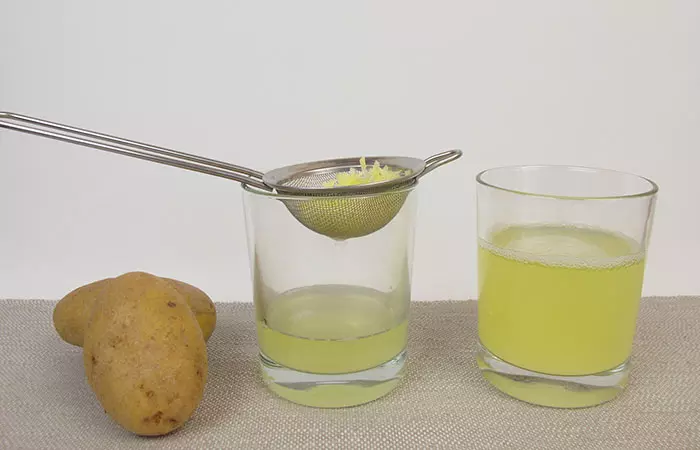
Preparing raw potato juice is quite easy. Just follow these steps:
- Wash the potatoes thoroughly and clean out any sprouts and green spots.
- Peel the potatoes and grate them.
- Put the grated potatoes on a linen cloth and squeeze out the juice.
- You can also chop the potatoes, put the pieces in a juicer and strain the juice.
- Drink the juice immediately. You can also let it cool in the refrigerator for a while and then drink it.
If you cannot drink potato juice as it is, try diluting it with water. If this does not work, scroll down for more ways to add potato juice to your diet.
How To Incorporate Potato Juice Into Your Diet
Here are some ideas on how to include potato juice into your diet:
- If you do not like the earthy taste of the juice, add lemon juice to it for a tangy twist.
- You may also use ginger to spice up the juice.
- Blend it with other fruits and vegetables like apples and carrots to enhance the flavor and nutrition palette.
- Add it to smoothies, soups, and broths for extra flavor.
Want to know how to store it for further use? Let’s find out how to go about doing that.
Can I Store It?
Made a large quantity of potato juice and are now wondering how to store the leftovers?
Well, first things first. Ensure you don’t make more potato juice than required. Only make as much as you can consume immediately. Potato juice is most beneficial only if it is consumed within 20 minutes of making it. Sabat says, “Potato juice turns black when it is exposed to air. This is because the potato juice contains an enzyme called polyphenol oxidase, which reacts with oxygen in the air to create a black pigment.”
Michael Garrico, a fitness coach and nutritionist, says, “The color of potato juice changes from white to black when it’s exposed to light. The reason for this is that the process of making potato juice uses sulfur compounds called thiosulfinates. These compounds react with oxygen in the air and form insoluble sulfides, which then precipitate out as a black substance that settles at the bottom of the jar during storage.”
But if you are still keen to store it, you can refrigerate the juice in an airtight glass jar for about 1 to 2 days.
All good things come with a clause. Here are a few things you might need to know before you start juicing up all the potatoes in your kitchen.
Any Side Effects I Need To Be Aware Of?
Yes, there are a few points to consider before you start using potato juice:
- This juice can cause an upset stomach, diarrhea, and vomiting if consumed in excess.
- Potato juice has high levels of sugar, so diabetics should be careful while drinking it.
- Pregnant and breastfeeding women should consult their physician before drinking potato juice.
- Since potatoes are rich in potassium, those with kidney issues should consult a healthcare professional before consuming potato juice. This is because in rare cases, increased potassium intake from food may cause hyperkalemia in those with kidney diseases (11).
Now that we’ve talked all about the benefits and side effects, let’s wrap this up and get straight to the bottom line.
Infographic: 8 Important Benefits Of Potato Juice You Should Know About
Potato juice is packed with essential nutrients that provide a host of health benefits to your body. We have rounded up the top 8 reasons why potato juice is good for you. Check out the infographic below to know more! Illustration: StyleCraze Design Team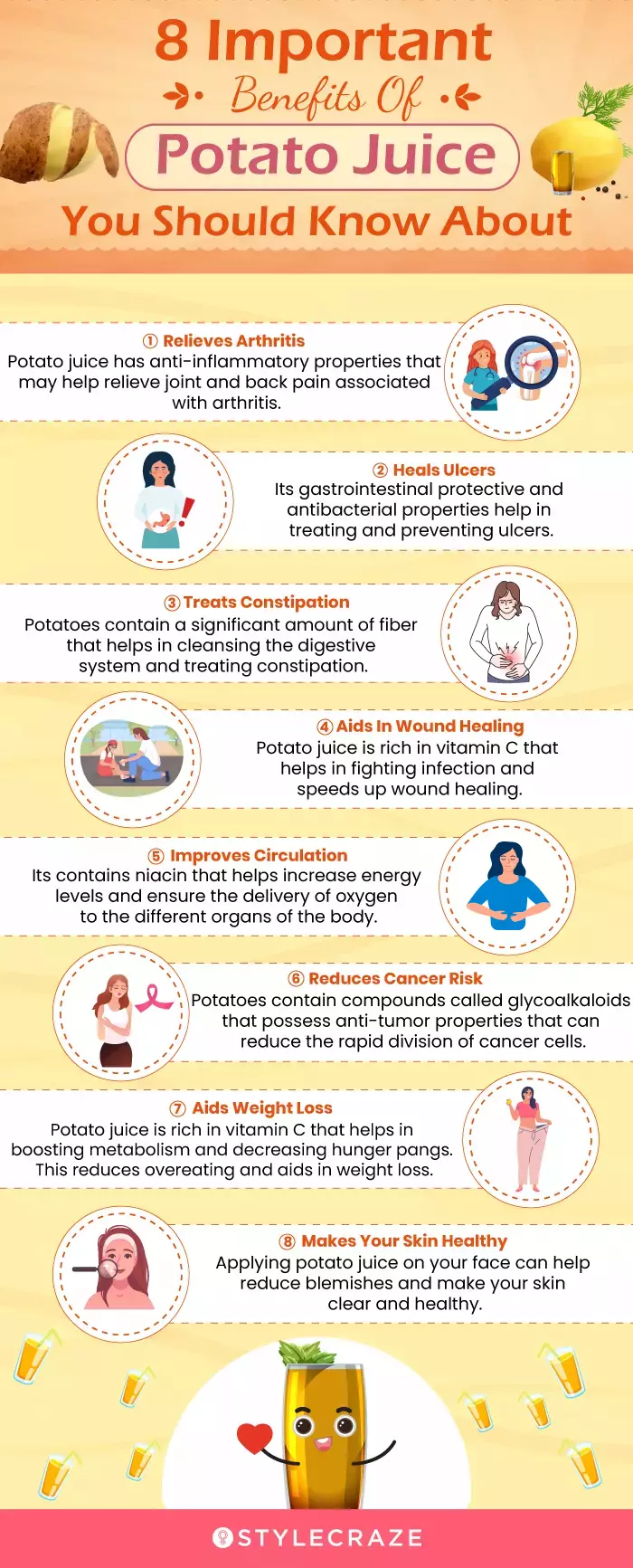
There are numerous benefits of potatoes, especially when used in the form of potato juice. The health benefits of potato juice can thus be attributed to its many nutrients. This vegetable juice contains vitamins B and C, potassium, calcium, iron, and phytonutrientsi Nutrients naturally found in plants that resist fungi, bacteria, and viral infections and help keep them healthy. . Drinking potato juice may boost immune health, gallbladder, and liver health, relieve arthritis, treat ulcers and constipation, and stress reduction. In addition, the juice hydrates your skin, makes the skin clear and blemish-free, reduces aging signs, relieves eczema, and promotes hair growth. However, excess consumption may lead to vomiting and diarrhea and upset your stomach. In addition, people with diabetes and pregnant and breastfeeding women should consult their doctor before consuming potato juice.
Frequently Asked Questions
Can potato juice be refrigerated?
Yes, it should be refrigerated if it isn’t consumed immediately.
Can potato juice be left overnight on the face?
Yes, you may leave a potato juice mask overnight on your face.
How long does potato juice last?
Potato juice can last in the refrigerator for a maximum of 3 to 4 days. But it is recommended to consume it as fresh as possible.
Can we apply potato juice on the face for removing hair?
Potato juice does not help in hair removal. It can only be applied to enhance skin health.
Where can I buy raw potato juice?
Raw potato juice is best made at home. But if you want to buy it, you can look at some online websites like Amazon.
Does applying potato juice on the face get rid of acne?
Yes, regular application of potato juice on the face helps to clear out acne.
Does the juice of potatoes help in removing tan?
Potato juice is extremely useful in removing tan since it has powerful bleaching properties.
What can I use to make a good potato juice face mask?
Mix 2 teaspoons each of cucumber and potato juice for your face mask. Keep it on for 20-30 minutes before washing it off with cold water.
Are potatoes good for constipation?
Yes, potatoes and potato juice are very effective for constipation.
Can I take potato juice every day?
Yes, potato juice can be taken every day, but not more than 1 to 2 glasses.
What happens if we drink potato juice daily?
Drinking potato juice daily will strengthen your immune system as it is rich in vitamin C.
Can I apply potato juice twice a day?
Yes, you can apply potato juice twice a day to get brighter, tighter, and younger-looking skin
Illustration: Benefits Of Potato Juice For Your Skin And Health
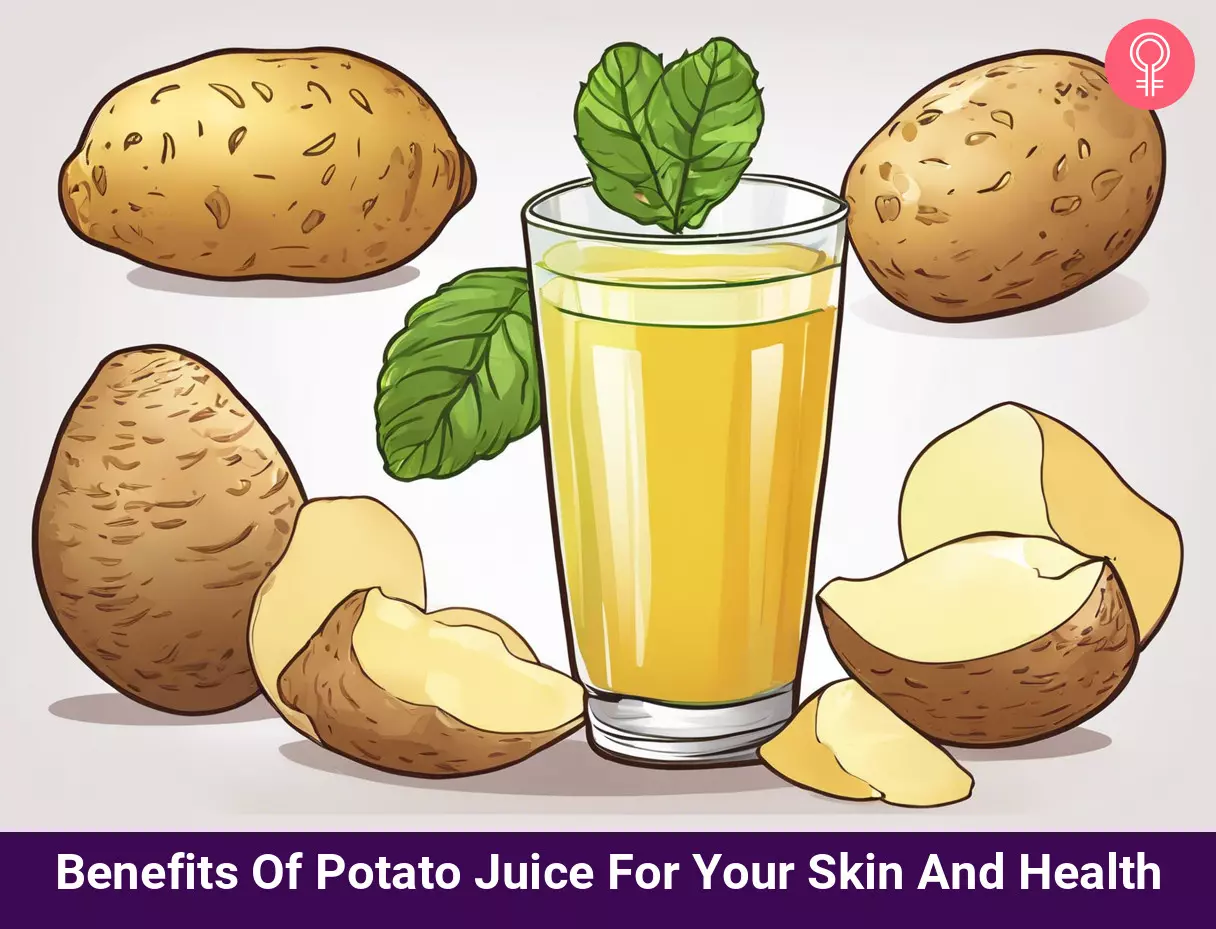
Image: Stable Diffusion/StyleCraze Design Team
It goes without saying that potatoes are a powerhouse of nutrition. But what about potato juice? Watch the following video to know more!
Personal Experience: Source
StyleCraze's articles are interwoven with authentic personal narratives that provide depth and resonance to our content. Below are the sources of the personal accounts referenced in this article.
i. How potato juice gave me my flawless skin
https://www.youtube.com/watch?v=MA8vT3D3B2U
References
Articles on StyleCraze are backed by verified information from peer-reviewed and academic research papers, reputed organizations, research institutions, and medical associations to ensure accuracy and relevance. Read our editorial policy to learn more.
- “Alternative Therapeutic Approaches to the Treatment of Arthritis”. Journal of Pharmacy Practice, CiteSeerX.
https://citeseerx.ist.psu.edu/viewdoc/download?doi=10.1.1.1010.8036&rep=rep1&type=pdf - Spray-Dried Potato Juice as a Potential Functional Food Component with Gastrointestinal Protective Effects, Nutrients, US National Library of Medicine, National Institutes of Health.
https://www.ncbi.nlm.nih.gov/pmc/articles/PMC5852835/ - Diets for Constipation, Pediatric Gastroenterology Hepalotgy & Nutrition, US National Library of Medicine, National Institutes of Health.
https://www.ncbi.nlm.nih.gov/pmc/articles/PMC4291444/ - Vitamin C, Gastritis, and Gastric Disease: a historical review and update, Digestive Diseases and Sciences, US National Library of Medicine, National Institutes of Health.
https://www.ncbi.nlm.nih.gov/pmc/articles/PMC3874117/ - Inhibitory effect of antioxidant extracts from various potatoes on the proliferation of human colon and liver cancer cells, Nutrition and Cancer, US National Library of Medicine, National Institutes of Health.
https://pubmed.ncbi.nlm.nih.gov/21888504/ - Anticarcinogenic effects of glycoalkaloids from potatoes against human cervical, liver, lymphoma, and stomach cancer cells, Journal of Agricultural and Food Chemistry, US National Library of Medicine, National Institutes of Health.
https://pubmed.ncbi.nlm.nih.gov/16029012/ - Medicinal use of potato-derived products: a systematic review, Phytotherapy Research, US National Library of Medicine, National Institutes of Health.
https://pubmed.ncbi.nlm.nih.gov/19441069/ - Efficacy and tolerability of potato juice in dyspeptic patients: a pilot study Phytomedicine U.S. National Library of Medicine National Institutes of Health.
https://pubmed.ncbi.nlm.nih.gov/16360927/ - Antioxidants in potatoes: A functional view on one of the major food crops worldwide MDPI U.S. National Library of Medicine National Institutes of Health.
https://www.ncbi.nlm.nih.gov/pmc/articles/PMC8122721/ - Development of herbal facial mask cream from suan sunandha palace facial beauty International Journal of Advances in Science Engineering and Technology
http://www.iraj.in/journal/journal_file/journal_pdf/6-332-148826702723-26.pdf - Potassium and health
https://www.ncbi.nlm.nih.gov/pmc/articles/PMC3650509/
Read full bio of Dr. Geeta Dharmatti
- Mary Sabat, MS, RDN, LD, is a registered dietitian and a certified in personal training by the American Council of Exercise. She has 30 years of experience in nutrition education, wellness coaching, fitness training, holistic health, and weight loss coaching. She obtained her bachelor's degree in Dietetics and Nutrition from the University of Delaware and master’s degree in Human Nutrition with an emphasis on Exercise Science from Rutgers University.
 Mary Sabat, MS, RDN, LD, is a registered dietitian and a certified in personal training by the American Council of Exercise. She has 30 years of experience in nutrition education, wellness coaching, fitness training, holistic health, and weight loss coaching. She obtained her bachelor's degree in Dietetics and Nutrition from the University of Delaware and master’s degree in Human Nutrition with an emphasis on Exercise Science from Rutgers University.
Mary Sabat, MS, RDN, LD, is a registered dietitian and a certified in personal training by the American Council of Exercise. She has 30 years of experience in nutrition education, wellness coaching, fitness training, holistic health, and weight loss coaching. She obtained her bachelor's degree in Dietetics and Nutrition from the University of Delaware and master’s degree in Human Nutrition with an emphasis on Exercise Science from Rutgers University.
Read full bio of Ravi Teja Tadimalla
Read full bio of Arshiya Syeda
Read full bio of Sindhu Koganti






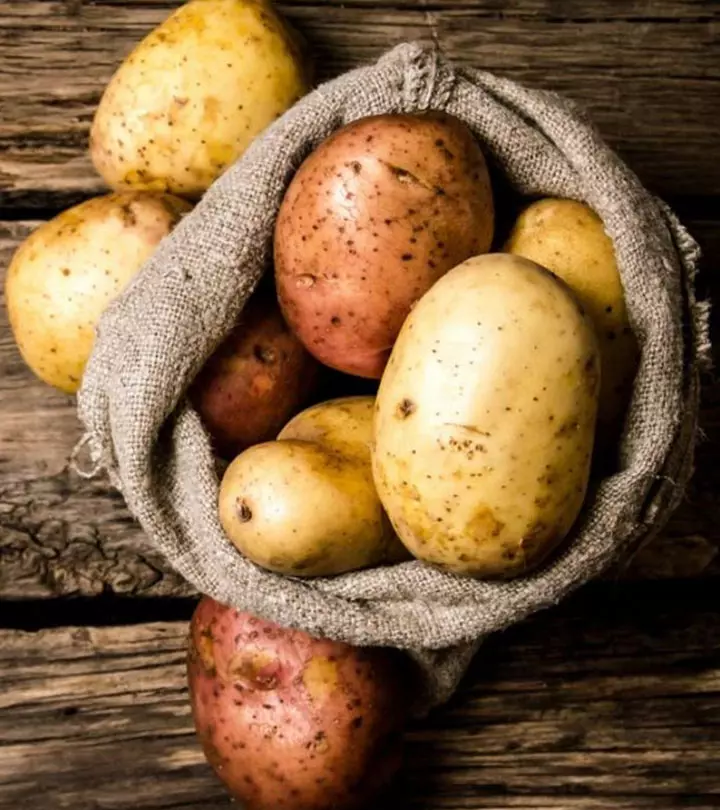
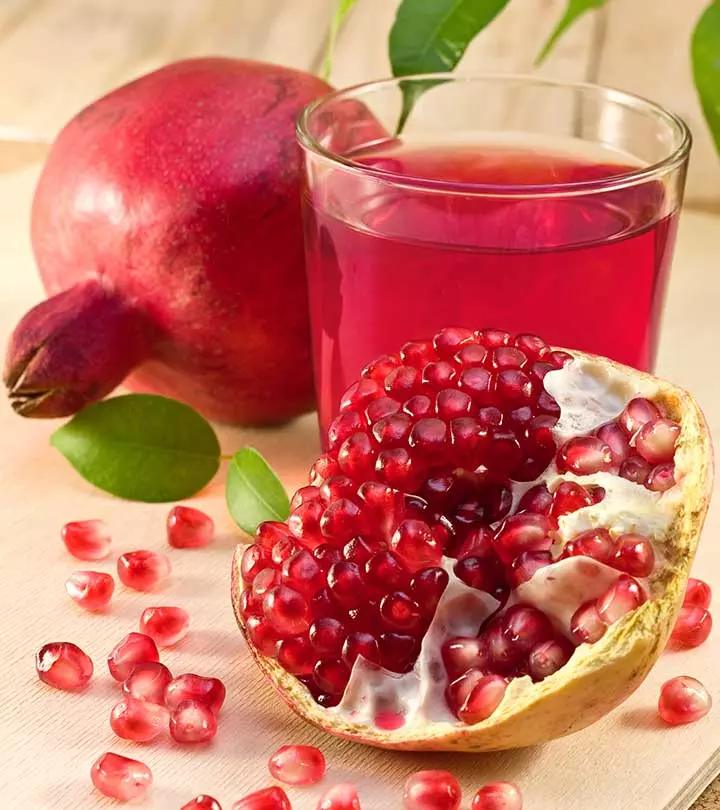
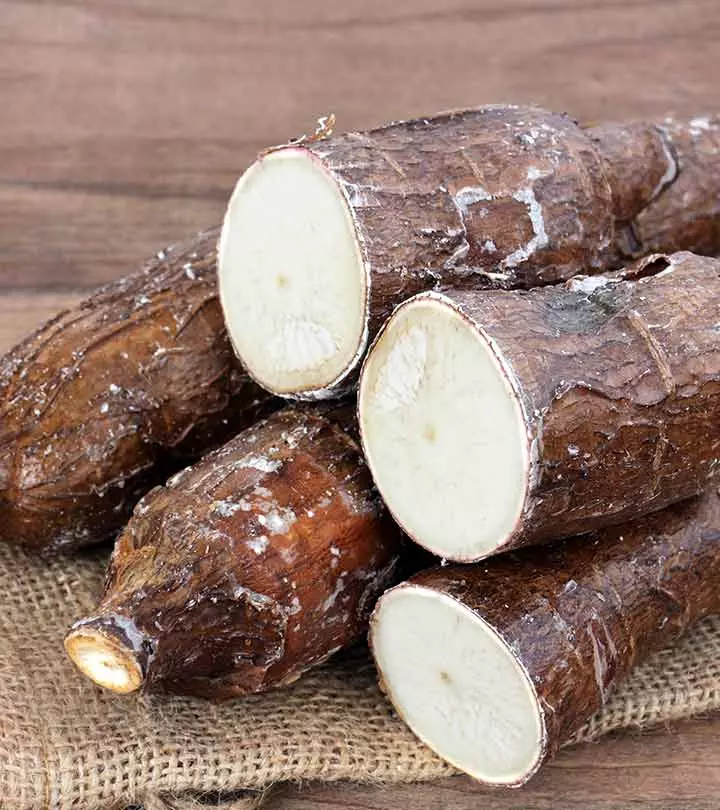
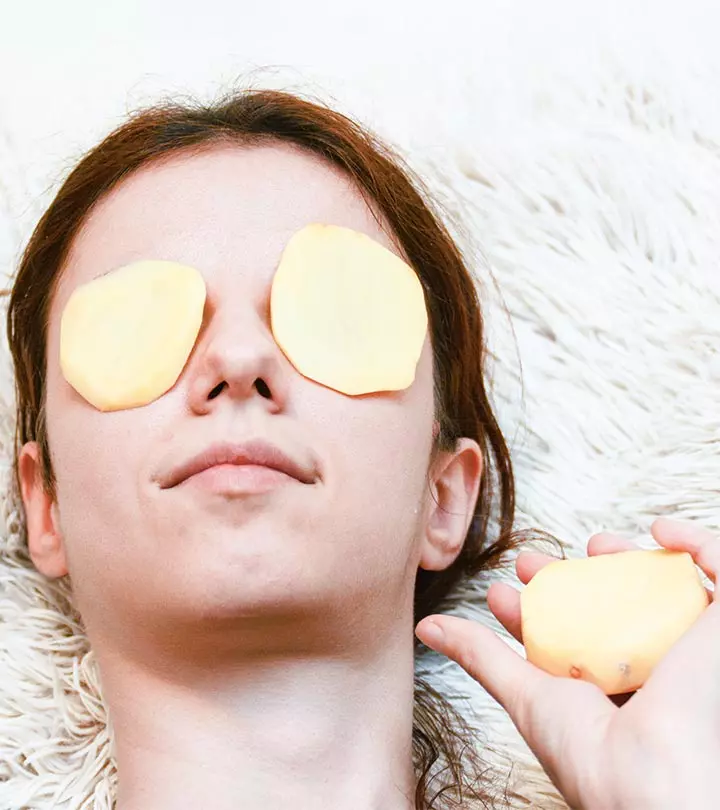


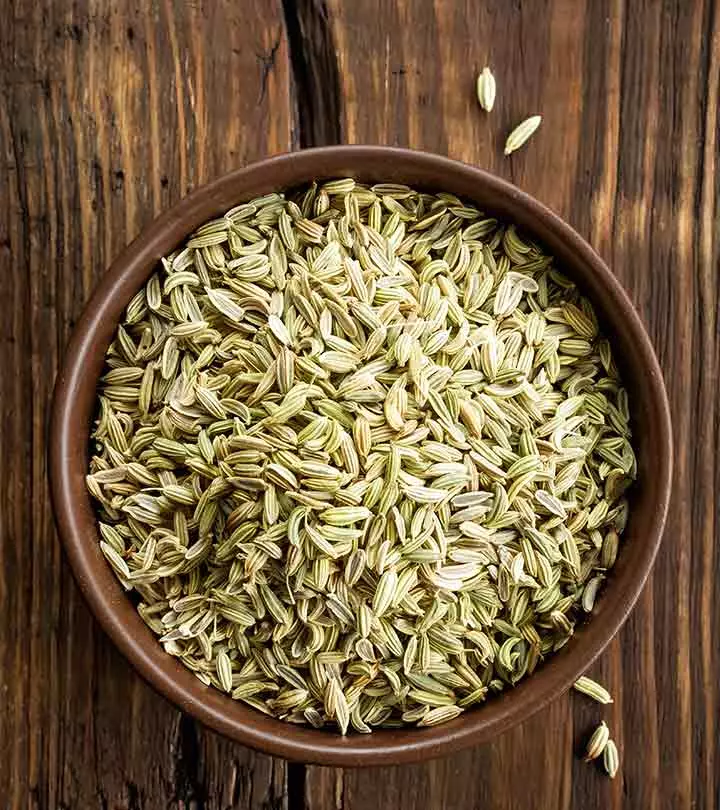
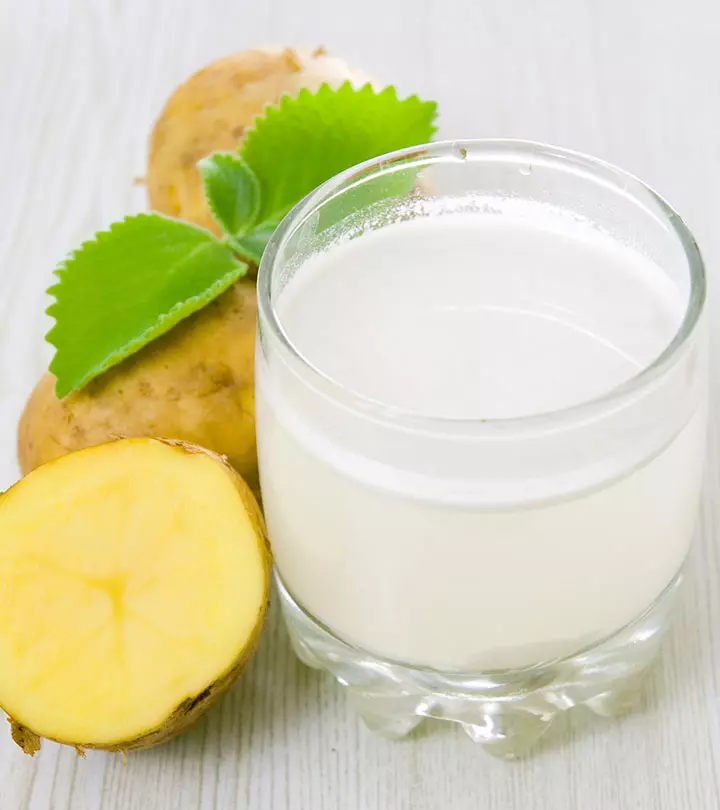

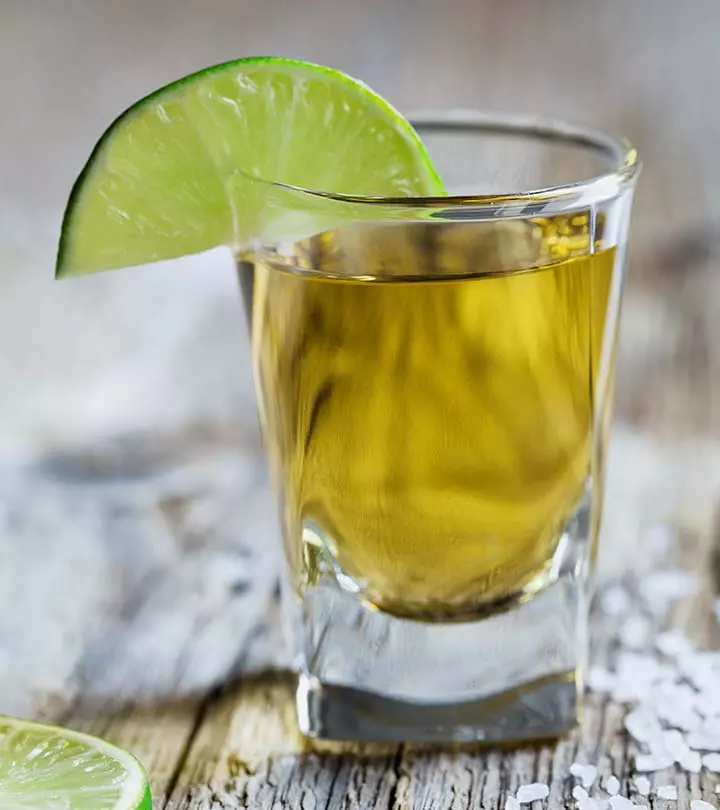
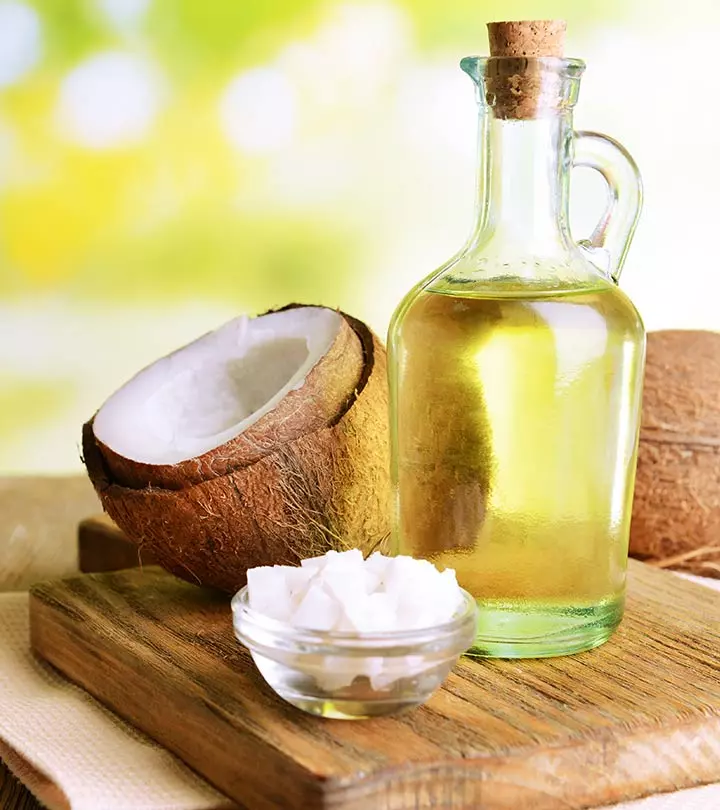
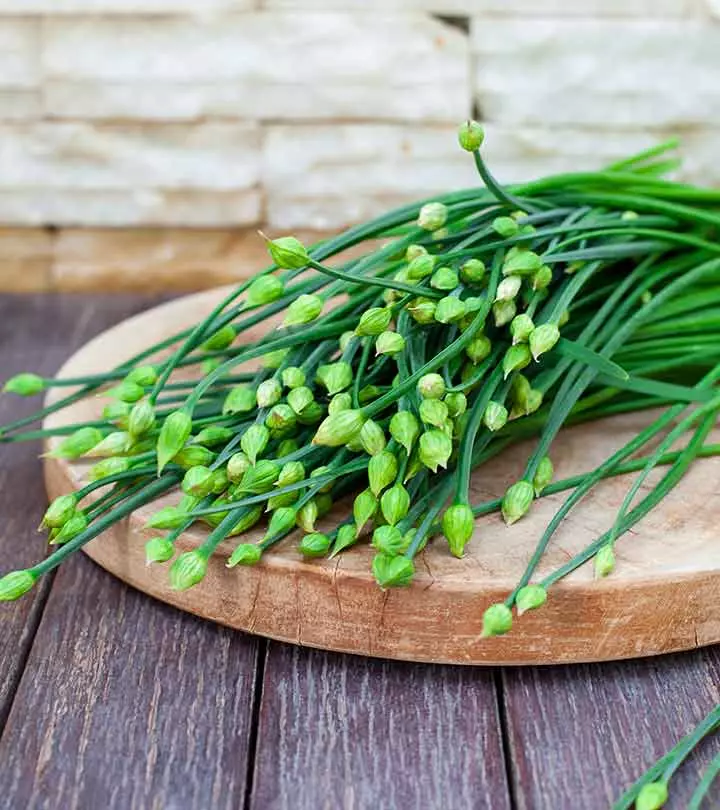
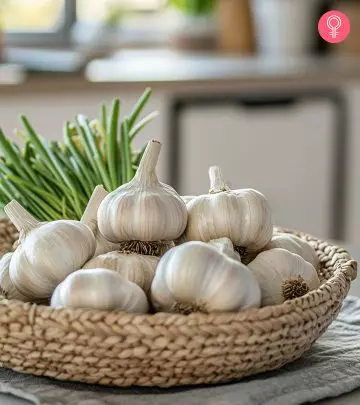
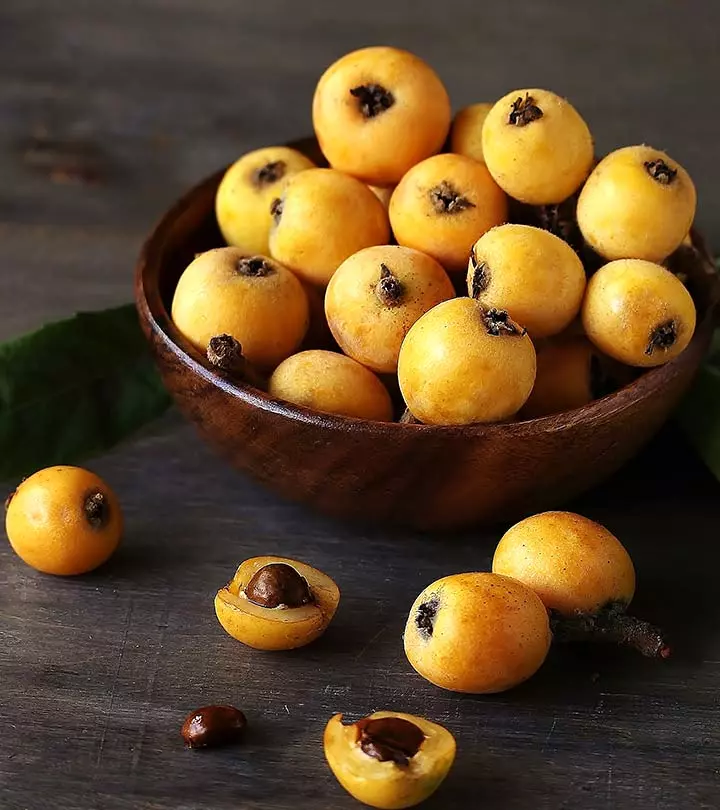

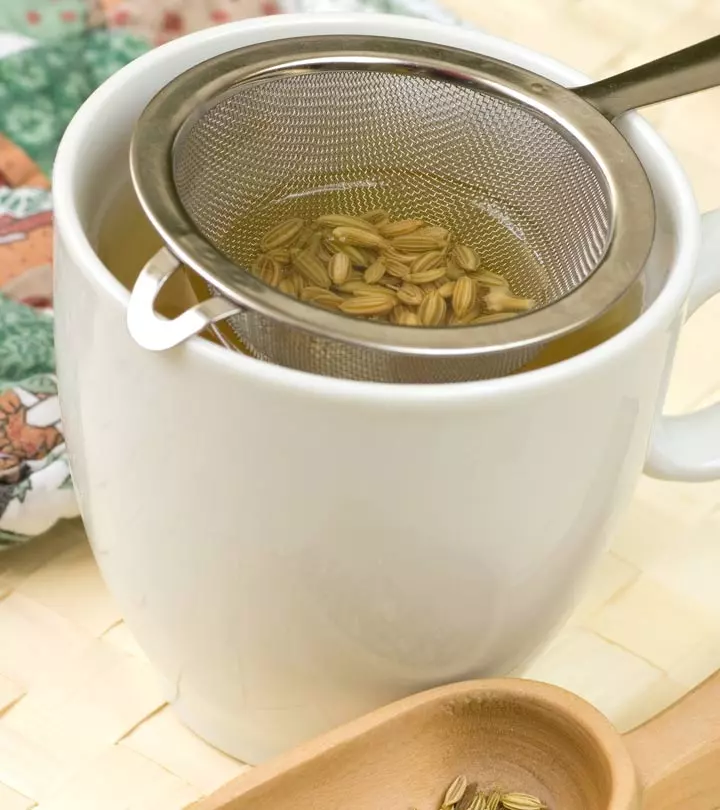
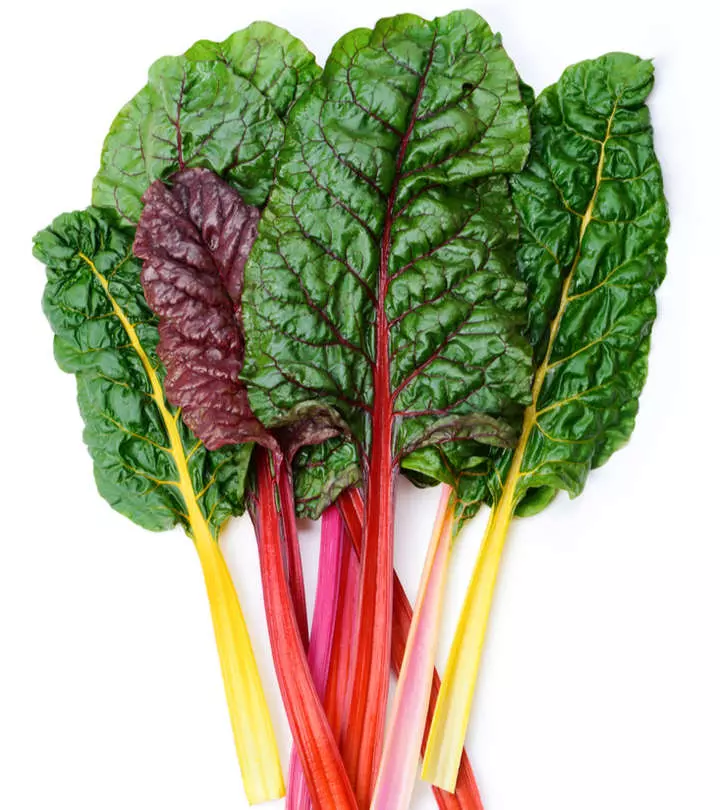

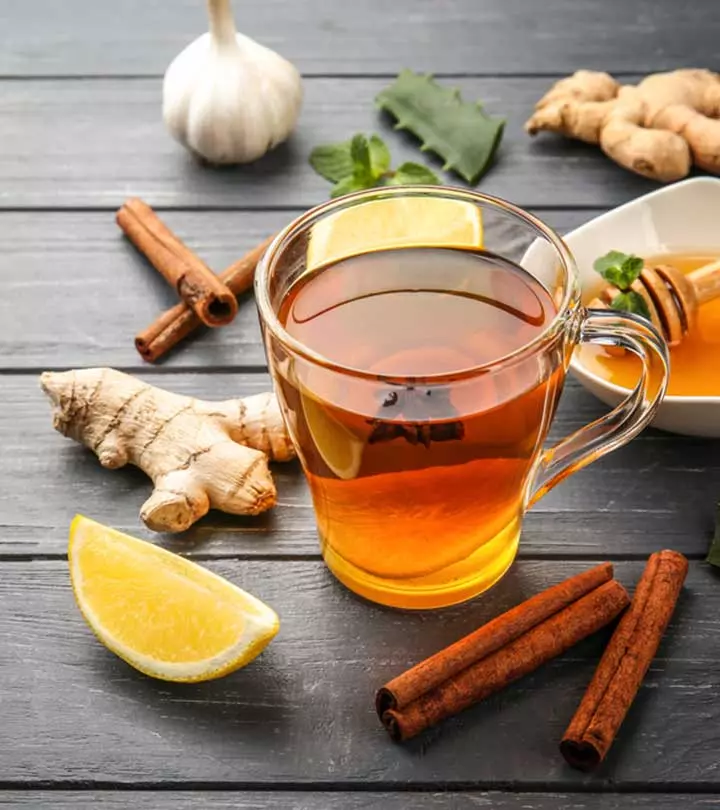
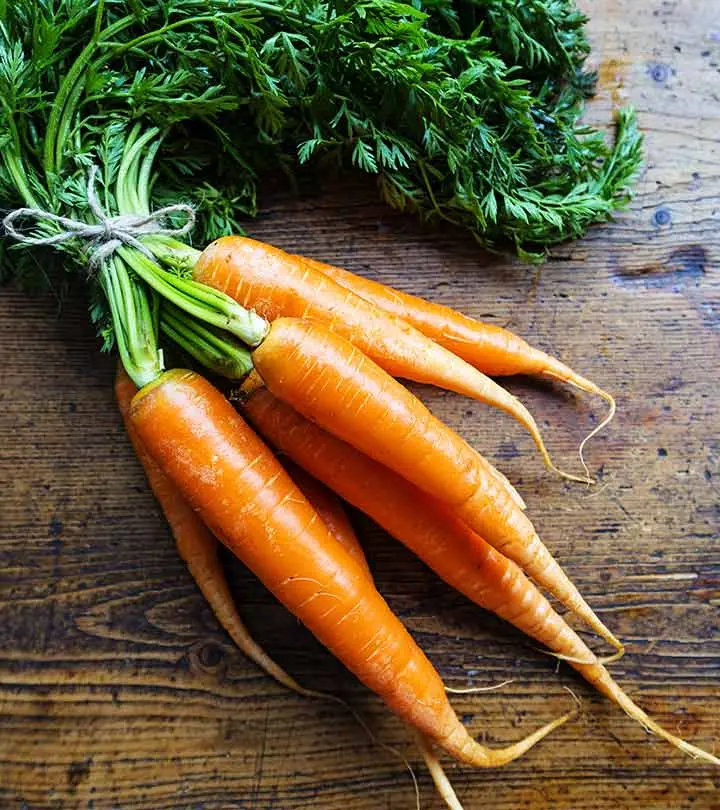
Community Experiences
Join the conversation and become a part of our empowering community! Share your stories, experiences, and insights to connect with other beauty, lifestyle, and health enthusiasts.